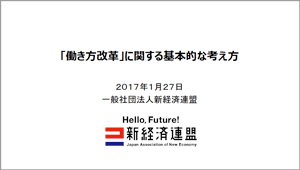- HOME
- Proposals/News
- Policy advocacy
- JANE issued its views on work style reform
JANE issued its views on work style reform
On January 27th, JANE submitted its views on work style reform to Minister for Working Life Reform and Minister of Health, Labor and Welfare.
The original document is available in Japanese

■Summary of the document■
1. Title
Views on Work Style Reform
2. Purpose
The document compiles JANE’s views on the government effort on workstyle reform, based on feedbacks and opinions from JANE member companies as well as from executive officers.
3. Summary
(1) Our basic views
Discussions are needed to encourage diverse workstyles and to increase labor mobility against the background of transformational changes including the fourth industrial revolution, artificial intelligence, robotics and automation.
Today’s environment demands a diversified approach to rule-making depending on job requirements, positions and actual duties performed, since reinforcing uniform regulations may weaken Japan’s competitiveness.
Japan’s global competitiveness hinges on the question of whether each one of us can work creatively without the constraints of time and space.
(2) Equal pay for equal work
The draft guideline stipulates that unreasonable differences in basic pay and other benefits based on forms of employment need to be eliminated
But at the same time, a flexible framework is required to accommodate a variety of individual needs, as not everyone wishes to work on permanent, full-time employment、preferring instead temping or fixed-term employment.
The uniform introduction of the “equal pay for equal work” principle could reduce the flexibility of work styles and forms of employment. Reform measures need to reflect balanced views, taking into account the actual conditions and needs of workers.
(3) Shortening of working hours
While the maximum work hours set by the “36 Agreement” on overtime and holiday work should be observed, the rigid application of a working hours cap could have a negative effect on Japanese competitiveness.
The current “standards on the limit of overtime work” allow for exemptions, implying a social consensus that regulation on working hours should be applied flexibly depending on the nature of work.
Exemptions with regard to working hours, holidays and extra pay should be applied to the types of companies that can be classified as “startup firms” or “knowledge society-oriented companies”. A new framework regulating working conditions for those companies should be considered.
The flexible work hours system is only applicable to a tiny minority of workers. We request that such current rules be regularly reviewed and be applied to broader areas of work, and that the white collar exemption should be introduced as soon as possible.
(4) Development of artificial intelligence and changing forms of labor
The rapid development of AI entails there are factors that need to be taken into account such as the substitutability of workers, workforce mobility, the importance of education and training, and re-defining of work.
Major shifts are required for individuals to direct their efforts into creative tasks and for companies to focus on high value-added work. Governments will need to review and substantially revise legal and institutional frameworks in keeping with fundamental changes in the nature of work.

